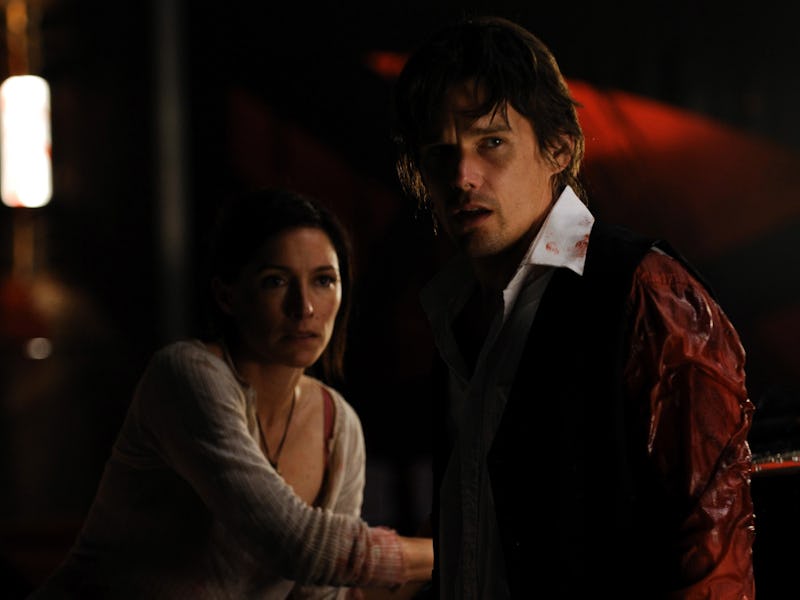Ethan Hawke’s Cult-Classic Vampire Flick Helped Reinvent The Genre
What if vampires were science fiction?

One could argue that the notion of vampires does not really constitute a genre unto itself. Yes, we can all imagine various stereotypical vampire stories, from the classics (Dracula) to the tragic (Only Lovers Left Alive) to the meta (What We Do in the Shadows.) Recently, the Robert Eggers’ Nosferatu remake has made a good argument for returning to the basic cinematic roots of vampire stories. But that doesn’t mean there aren’t a ton of strange vampire remixes out there. And a few, rare vampire films even assert that maybe the entire conceit of bloodsuckers could be viewed less as horror and more as science fiction.
If the Underworld series is the extreme, gonzo end of vampires-as-science fiction, then the 2005 film Daybreakers represents the underrated indie attempt. With this low-key cult classic, Ethan Hawke starred as a vampire who refused to drink human blood, which created a fascinating study on how to subvert expectations. Fifteen years after its release on January 8, 2010, Daybreakers is better than it has any right to be and will turn any non-horror fan into someone who is at least vampire-curious.
The basic conceit for Daybreakers flips the script on what we expect from vampire narratives. Instead of vampires hiding in the shadows, they’re the ruling class. In this twisted future, most humans were turned into vampires by a mutated virus. The title Daybreakers refers to the fact that although most humans are limited to the darkness, many characters drive around in specially tinted cars during the day. The vampire majority of the world thinks of most humans as walking blood bags, a commodity that is steadily growing scarcer.
But, the basic sci-fi twist is that, like the idea that the spice must flow in Dune or that the One Ring must be destroyed in The Lord of the Rings, the plot of Daybreakers is propelled by the idea that one guy, Edward Dalton (Ethan Hawke), wants to create a blood substitute that will prevent vampires from having to prey upon humans for blood. Dalton is an ethical kind of vampire, only sustaining himself on blood from animals and not from humans. He’s also a literal hematologist, making him a science expert working to solve the ills of the world by doing science.
In the older days of early 20th-century science fiction, this choice — having a specialist in a field of science as your hero — was one of the primary qualifications of certain types of SF being taken seriously within publishing circles. Though the history of the so-called “Golden Age” of science fiction is replete with problematic figures, including Astounding (later Analog) editor John Campbell, the idea that writers like Isaac Asimov were encouraged to make scientists and engineers into heroes was extremely innovative and highly influential. It’s one of the reasons that more current works like The Three-Body Problem are so significant and interesting; the heroes are crunching numbers and doing lab work as much as they are out there having adventures.
This isn’t to say that Daybreakers is on the same level as Three-Body Problem or early Asimov short stories. But, the fact that it tries at all is notable and laudable. Written and directed by twin brothers, Peter and Michael Spierig, the basic trappings of Daybreakers are far more reasonable than their other, much more famous 2014 sci-fi film, Predestination, which was based on Robert Heinlein’s time travel paradox story, “ ‘—All You Zombies—’.” What makes Daybreakers better than that film, and better than many late-’90s/early-aughts vampire movies is that it doesn’t rely too heavily on twists to tell a compelling story.
Willem Dafoe, Ethan Hawke, and Claudia Karvan brace for the worst in Daybreakers.
While it's somewhat true that the set-up of Daybreakers is more interesting than the movie itself, the film is extremely rare within all the genres that it touches. And, because it has a very old-school science fiction narrative device, there’s something about it that feels almost quaint. It was an odd film in 2010 but feels even older because of the fact that the aesthetics seem closer to The Matrix or Gattaca. The world-building in Daybreakers is nothing like a William Gibson novel, and yet, the visual style feels aligned with the downtrodden cyberpunk aesthetic of the 1980s.
All in all, Daybreakers is a mishmash of styles, concepts, and genre tropes. It’s by no means the best vampire movie of all time, nor is it the best sci-fi virus/outbreak movie of time. But, in the very small category of whatever kind of movie Daybreakers really is, it reigns supreme.